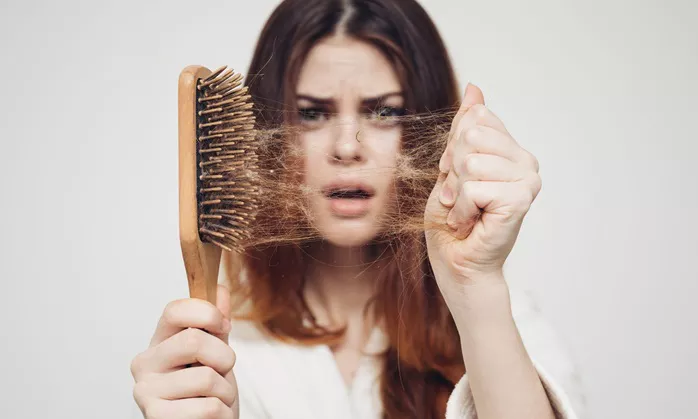Polycystic Ovary Syndrome (PCOS) affects millions of women worldwide, impacting various aspects of health, including hair growth. One of the distressing symptoms for many women with PCOS is hair loss. Understanding why this happens and how to manage it effectively is crucial for those affected.
What is PCOS?
PCOS is a hormonal disorder that affects women of reproductive age. It is characterized by irregular periods, elevated levels of androgens (male hormones), and cysts on the ovaries. This hormonal imbalance can have widespread effects on the body, including the hair follicles.
Understanding PCOS Hair Loss
Hair loss in PCOS, known medically as androgenic alopecia, is typically caused by an excess of androgens such as testosterone. These hormones can shrink hair follicles, leading to thinner, weaker hair strands that are more prone to falling out. This type of hair loss often manifests as:
Thinning of the hair on the scalp, particularly at the crown
Increased shedding of hair
Receding hairline or widening part
Will the Hair Grow Back?
The prognosis for hair regrowth in PCOS depends on several factors, including how well the condition is managed and individual genetics. In many cases, with appropriate treatment and lifestyle changes, hair can grow back. Here are key strategies to promote hair regrowth:
Medical Treatments
Medications: Your healthcare provider may prescribe medications such as spironolactone or finasteride to help block the effects of androgens on the hair follicles.
Topical Treatments: Minoxidil (Rogaine) is commonly used to stimulate hair growth and is available over-the-counter. It works by increasing blood flow to the scalp and revitalizing hair follicles.
Hormonal Therapy: Birth control pills containing estrogen and progestin can help regulate hormone levels, reducing the impact of androgens on hair follicles.
See also: What to Eat to Stop Hair from Falling Out?
Lifestyle Changes
Healthy Diet: A balanced diet rich in vitamins and minerals, particularly those that support hair health like B vitamins, zinc, and iron, can promote hair regrowth.
Exercise: Regular physical activity can help manage insulin levels and improve overall hormonal balance, which can indirectly support hair regrowth.
Stress Management: Stress can exacerbate hormonal imbalances. Techniques such as yoga, meditation, or counseling can help reduce stress levels and promote hair regrowth.
Hair Care Practices
Gentle Hair Care: Avoid harsh styling techniques, excessive heat, and chemical treatments that can further damage fragile hair.
Scalp Care: Keep the scalp clean and healthy. Consider using mild shampoos and conditioners formulated for sensitive scalps.
Hair Supplements: Some women find benefit from supplements like biotin or saw palmetto, although their effectiveness can vary.
Managing Expectations
While treatments can help promote hair regrowth, it’s essential to manage expectations realistically. Hair regrowth can be gradual and may not fully restore hair to its original density. Consistency in treatment and patience are key.
When to Seek Professional Help
If you’re experiencing significant hair loss or are unsure about the best treatment options for PCOS-related hair loss, consult a healthcare provider or dermatologist specializing in hair disorders. They can provide personalized recommendations based on your individual needs and medical history.
Conclusion
PCOS-related hair loss can be distressing, but with the right approach, including medical treatments, lifestyle adjustments, and proper hair care practices, many women can experience significant improvement in hair regrowth. Managing PCOS effectively involves addressing the underlying hormonal imbalance, which not only supports hair health but also overall well-being. By taking proactive steps and seeking professional guidance when needed, women with PCOS can optimize their chances of regaining healthy, vibrant hair.
FAQs
Is Hormonal Hair Loss Reversible?
Hormonal hair loss can be partially reversible, depending on the underlying cause and how promptly it is addressed. In the case of PCOS, hair loss is often due to an excess of androgens, which can shrink hair follicles and cause hair thinning or shedding. Here are some key points regarding its reversibility:
Treatment and Management: With proper medical treatment and lifestyle changes, many women with PCOS can see an improvement in hair growth. Medications like spironolactone, minoxidil, and hormonal contraceptives can help regulate hormone levels and stimulate hair growth.
Early Intervention: The sooner you address the hair loss, the better the chances of reversing it. Early treatment can prevent further damage to hair follicles.
Consistency and Patience: Hair regrowth takes time. It may take several months of consistent treatment to see noticeable results. Patience is crucial.
However, complete restoration to the original hair density may not always be possible, and individual results can vary.
Howto Permanently Remove Hair with PCOS?
Excess hair growth, or hirsutism, is another common symptom of PCOS due to elevated androgens. Here are some methods for permanent hair removal:
Laser Hair Removal: This method uses concentrated light to target hair follicles, reducing hair growth over multiple sessions. It is effective for many women with PCOS but may require maintenance treatments.
Electrolysis: This technique involves inserting a tiny needle into each hair follicle and applying an electric current to destroy it. Electrolysis can permanently remove hair, but it is time-consuming and may be uncomfortable.
Prescription Medications: Some medications, such as eflornithine (Vaniqa), can reduce hair growth when applied topically. These are often used in conjunction with other hair removal methods.
Does PCOS Hair Ever Go Away?
Excess hair growth caused by PCOS can be managed and reduced, but it often does not go away completely without ongoing treatment. The persistence of symptoms varies among individuals:
Long-Term Management: Consistent treatment and lifestyle management are essential to control symptoms. Medications to regulate hormone levels can significantly reduce hair growth over time.
Hair Removal Techniques: Regular hair removal methods, such as waxing, shaving, or using depilatory creams, are often necessary for maintenance.
Medical Treatments: Ongoing use of medications like anti-androgens or birth control pills can help keep hair growth in check.
You May Be Interested In

